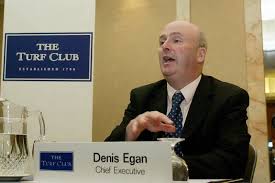Audit Expert Warns of ‘Alarming Failures’ in Irish Horseracing Board’s Governance: Breaches of Trust and Financial Lapses Spark Calls for Reform
Former CEO Denis Egan received an exit payment of €384,870 in 2021, a sum 58% above the amount allowed under the IHRB’s own early retirement scheme.
11/5/20243 min read


The Mazars investigation into the Irish Horseracing Regulatory Board (IHRB) reveals governance lapses that raise serious concerns, though whether they amount to outright corruption remains complex. Let’s examine the findings.
1. The Jockeys Emergency Fund (JEF) Transfer:
The IHRB’s Chief Financial Officer at the time, Donal O’Shea, transferred €350,000 from the JEF to the IHRB bank account to cover an alleged cashflow shortfall. This was done without notifying JEF trustees, obtaining board approval, or informing the executive team—each of which would be standard protocol in a transparent, accountable organization. The Charities Act strictly requires that funds designated for charitable purposes be used accordingly, and this transfer clearly breached that legal requirement.
Sign of Corruption? At minimum, the transfer reflects a lapse in judgement and governance. While it may have been motivated by a pressing financial need, bypassing necessary approvals indicates a troubling willingness to sidestep internal controls. It is less clear whether there was an intention to misappropriate funds or if this was a reckless but panicked move to resolve immediate cash needs.
2. Denis Egan’s Severance Payment:
Former CEO Denis Egan received an exit payment of €384,870 in 2021, a sum 58% above the amount allowed under the IHRB’s own early retirement scheme. The payment reportedly drew on both HRI funding and contributions from the Irish National Hunt Steeplechase Committee and the Turf Club. Mazars found no formal approval or documented support from HRI, despite IHRB board members claiming they had received “implied approval.”
Sign of Corruption? This raises more significant red flags. Here we see a case of senior executives being financially rewarded beyond what policy allowed, without official approval or adequate oversight. The attempt to retroactively frame the payment as part of the redundancy scheme appears dubious and suggests, at best, an unprincipled bending of the rules. Whether it qualifies as corruption might depend on the motive; was this a case of favoritism, or a genuine administrative oversight that failed spectacularly?
3. Lack of Financial Safeguards and Oversight:
Mazars’ report points to systemic issues, including inadequate financial segregation between the IHRB’s statutory role and its charity oversight. Without clear distinctions in governance, funds designated for specific purposes become vulnerable to misuse or misinterpretation. Mazars recommended additional safeguards to ensure stronger oversight, suggesting that the organization’s current controls are insufficient for managing public and charitable funds.
Sign of Corruption? Weak oversight is fertile ground for financial mismanagement, but it does not prove deliberate corruption. The IHRB’s restructuring efforts are clearly overdue, and though the leadership appears committed to change, the case reflects a troubling lack of checks that could easily be exploited by individuals with less honorable motives.
4. Actions Taken and Assurances Given:
In response to the investigation, current IHRB Chief Executive Darragh O’Loughlin has pledged that governance changes are underway. O’Loughlin assures the public that transaction controls and oversight processes have been tightened to prevent similar incidents, with a commitment to implement Mazars’ recommendations by year’s end. This may help rebuild trust, but it will take time to restore confidence.
Final Analysis: Corruption typically involves intentional wrongdoing for personal gain, and while elements of these findings are murky, outright intent is difficult to prove. What’s clearer is that the IHRB exhibited lapses in integrity, accountability, and compliance, with decisions and actions that at times bordered on self-serving and unaccountable.
Assessment from an Irish Audit Expert:
“This report should sound alarm bells—not only for the IHRB but for any organization overseeing public or charitable funds in Ireland. What we’re seeing here are classic failures of financial governance: the unauthorized transfer of funds, lack of documented approvals, and apparent disregard for internal controls that should, in any reputable organization, be absolutely non-negotiable. It’s one thing to face unexpected cashflow issues; it’s quite another to breach the Charities Act without consulting trustees or obtaining proper approval.”
“The use of charitable funds as a temporary cashflow solution is a direct contravention of legal and ethical guidelines governing Irish charities. This isn’t just a financial misstep; it’s a breach of trust with the public, who rightly expect charitable funds to serve charitable purposes, not to paper over gaps in a regulatory body’s budget. As for Mr. Egan’s exit payment, the inflated severance package suggests either a lack of understanding of—or disregard for—the policies in place. When the board’s defense rests on ‘implied approval,’ it speaks volumes about a lack of rigor and accountability in their processes.”
“For Irish charities and quasi-public bodies, the takeaways here are critical. Transparency and documented approvals aren’t just bureaucratic hoops—they are essential safeguards against both unintended misuse and deliberate abuse. The IHRB’s assurances of reform are important, but without structural and cultural changes, these promises risk becoming little more than lip service. The sector will be watching closely to see if the IHRB genuinely raises its standards and takes governance seriously moving forward.”
